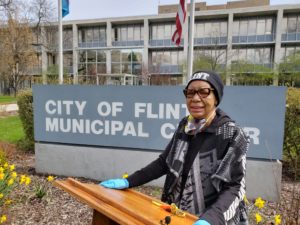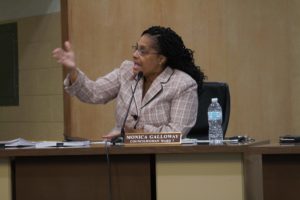By Tom Travis
Flint City Council in a 6-1-2 vote approved a $20 million portion of the $641 million water crisis settlement (WCS) at a video conference meeting Monday.
The council vote was required on the $20 million portion because it is being offered from the City’s insurance company and the City of Flint is named as a defendant in the settlement case.

Flint Water Tower (Photo by Tom Travis)
The Council’s yes votes came from Council Vice President Maurice Davis (2nd Ward), Santino Guerra (3rd Ward), Council President Kate Fields (4th Ward), Herb Winfrey (6th Ward), Allan Griggs (8th Ward) and Eva Worthing (9th Ward). Councilperson Jerri Winfrey-Carter (5th Ward) was the only no vote. Both Councilpersons Eric Mays (1st Ward) and Monica Galloway (7th Ward) abstained.
The City Attorneys have three clients – Mayor, City Council and The City of Flint
The city council was in a unique and perplexing position in the water crisis settlement, according to officials and legal experts following the situation. The city council is an elected body representing citizens of Flint in a legislative role in city government. In this case, in the WCS, while the city council was not named as a defendant, the City of Flint was named.
The City of Flint relies on the city council to approve or not approve monies spent. In the case of the WCS, the city council was the city entity to decide whether to accept the city’s insurance company’s $20 million offer towards the WCS.
Before the vote, Councilperson Galloway said, “You can’t put a price tag on the residents who…didn’t die from lead. We minimize what has happened to this community under the optics of lead because that makes it easy. But it was about negligence. This was about deliberate negligence…
“The reality is that this is not okay,” Galloway continued. “The Michigan Civil Rights Commission says [In a February, 2017 report] that this is systemic racism…So I will not allow myself to operate as a defendant in this when actually we are very much plaintiffs.
“Unfortunately the fear factor has taken its roots and we find ourselves where we are. But my name, my legacy, won’t be attached to any of this–the small amount that was paid for the attempted murder of an entire city.”
During public speaking, water warrior and local activist Claire McClinton called in to add her thoughts.
“The State of Michigan is getting away, they getting it real light,” McClinton said. “They have abused this city unbelievably, horrifically. They sent in the emergency managers. The emergency managers switched us to the river water. The EPA [Environmental Protection Agency] sued us to get on the 30-year deal [an agreement with the Great Lakes Water Authority, passed by the Weaver administration] talking about our health. But then you turn around and offer this $600 million of settlement not for our health.

Claire McClinton speaking at the sixth anniversary of the Flint Water Crisis in front of City Hall in April 2020. (Photo by Tom Travis)
“We are about tired of the State of Michigan beating up on this community and all for the interest of nameless, faceless, bond holders and corporate interests to privatize and steal our water,” she added.
“That’s what this all started with. So the votes are in. I’m not a council person. The deck is stacked. But the question is this, after you vote and I’m proud that y’all found a way to fight for your own representation [referring to the city council hiring their own outside attorney], I think that’s a good thing, regardless of how you vote now. What will you do about it?
“When will the city council take up the banner and take the State of Michigan, its cohorts, like the bond holders and the MDEQ, when do we fight that at city council?” McClinton said. [The Michigan Department of Environmental Quality was renamed the Michigan Department of Environment, Great Lakes and Energy (EGLE) by executive order of Gov. Gretchen Whitmer. The change took effect in April, 2019.
144 join in the hearing with Federal Judge Levy
U.S District Federal Court Judge Judith Levy held a two-hour zoom/Youtube preliminary hearing Monday afternoon. During that hearing there were, according to Judge Levy, 144 people, mostly attorneys, on the screen.

The U.S. Federal Court room from which Judge Levy spoke during the Dec. 21 preliminary hearing. (Photo from mied.uscourts.gov website)
Included were attorneys Flint has become familiar with through the water crisis and settlement talks: Corey Stern, Ted Leopold, Michael Pitt, Rick Berg, Val Washington, and many others. Also present on the video were City Attorney Angela Wheeler and Assistant City Attorney Bill Kim.
U.S. District Judge Judith Levy hears from Flint
During the hearing Judge Levy recalled she was appointed to the Federal Court by former President Barak Obama in March 2014, one month before the Flint water switch occurred. She said she would be willing to have “days” of hearings so that everyone could be heard.
“I have received numerous communications from the residents of Flint. I will consider everything that’s been said here today,” Levy said. “I hear you. I’m reading your papers. I intend to fully address what needs to be. We want what’s fair and just here. I will issue a written decision by mid-January,” she said.
Judge Levy maintained a calm and gentle voice as she addressed a group of attorneys who, from both sides, became passionate and heated about the cases they are working on.
Ad hoc committee of two – Kate Fields and Eric Mays — met Monday
Council President Fields and Councilperson Mays met Monday with “several different” law firms looking for an attorney who could represent the Flint City Council in regards to the WCS. Fields introduced Richard Wilson of Mika Meyers law firm from Grand Rapids.
Fields explained that she and Mays would be an “ad hoc committee of two” to seek an attorney to represent the council. Fields stated they looked for a law firm large enough to handle the water settlement case and who had experience with municipal law and class action and environmental cases. Fields added it was important the law firm have no conflict of interest. Fields said they had chosen two firms but at “the last moment” one of the firms dropped out.

Councilpersons (l to r) Eric Mays (1st Ward), Maurice Davis (2nd Ward), Santino Guerra (3rd Ward), and Kate Fields (4th Ward) in a 2019 City Council meeting. (Photo by Tom Travis)
Fields asked Wilson, “Do you think the city council has the right to file a response to the motion [WCS]?” Wilson responded, “Absolutely not. The city council is not a party to the litigation, as far as I know. It is the City of Flint that is the party. The city council, as a body, would have to first seek leave or permission from Judge Levy in order to file something.” He said the firm would charge $295/hour.
It is not yet clear if the council will proceed with retaining an attorney to represent them in further water settlement litigation or to file for permission to go before Judge Levy.
Referring to the council’s complicated legal representation situation, during public speaking, frequent commentator of the water crisis story Patrick Rose, an attorney and Flint native now of East Lansing, raised the issue that The City Attorneys do represent City Council. He referenced Charter section 4-601b. Quoting the Charter, “The language says the city attorney shall manage and direct those matters not only in the interest of the Mayor and City Council but also in the interest of the City of Flint.”
City Attorney Angela Wheeler (standing) during a 2019 council committee meeting. (Photo by Tom Travis)
Rose continued, “Now the council, as I understood it from the last meeting, I only know what I heard from the public session of the last three meetings council, wants to settle unconditionally and dedicate the $20 million to obtain a release and may have a majority vote for that and still want to be heard in front of a court in a pleading that the court accepts.
“And yet the violations of 4-601b that I heard essentially were that no offers to settle were shared with city council and the council was denied the opportunity for input. That was said by various members that they weren’t given a chance to have input. Council was told it’s not a client by one of the attorneys. Council was told it lacked standing by another attorney.
“Council was told it can’t seek permission to file a response for the motion which this attorney tonight contradicted. All of those could be interpreted to violate the city attorney’s duty and triggered the independent attorney and I heard the council pass that resolution to hire an independent attorney.
“Today in court, listening to the entirety of Judge Levy’s open court session not one of the city’s attorneys notified Judge Levy, Judge Murray or Judge Farah of that resolution or of the city council’s request for an independent attorney prior to the rulings that concern the motion to confirm the settlement. Why is that important? It’s important because it’s an open question whether the city attorneys have breached the duty to represent the council adequately,” Rose said.
If residents want to communicate to U.S. Judge Judith Levy her contact information is provided here: Judge Judith Levy, U.S. Eastern District of Michigan, 200 East Liberty Street, Suite 300, Ann Arbor, MI 48104.
The City Council will meet again by video conference on Monday, Jan. 11 at 5:30 p.m.
EVM Managing Editor Tom Travis can be reached at tomntravis@gmail.com.




You must be logged in to post a comment.